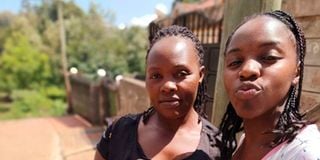
Joyce Ong’ombe (left), a patient who is currently admitted at Kenyatta National Hospital, with her daughter Georgina Ooko, who died on January 14, 2025. The two suffered burns when a boiler exploded on in a Mombasa apartment they were staying in while on vacation. Pool
The past 14 years have been tough for her Joyce Ong’ombe, a widow currently fighting for her life in the burns unit of the Kenyatta National Hospital (KNH).
In April 2010, she lost her husband George Ooko Ochieng, who was aged 32, and two of their three children in an accident. The minors died at the age of eight (Angella Ooko) and three (John Ooko).
With the deaths, Joyce was left as a young widow with an infant to take care of. That infant, Georgina Ooko, grew to be a bright girl who got admission to the Alliance Girls High School. Painfully for Joyce, Georgina died just 14 days into 2025.
That is not all. In 2012, Joyce lost both her parents on the same day. Now she is orphaned, widowed, childless, and fighting for her life.
How did she get there? A few key events will explain.
December 30, 2024. Nyali, Mombasa County. Everyone is excited that 2024 is done and 2025 is arriving. Joyce and her daughter, Georgina, book into an apartment seeking to usher in the new year while on vacation, away from their home in Ngong and her busy career life in Nairobi. Since losing three family members, mother and daughter are predictably close.
December 31, 2024. It is 9am, Joyce and her daughter are preparing breakfast in their rented apartment. Then the worst happens.
A boiler explodes, letting out steam and hot water. Both mother and daughter suffer severe burns as a result. The daughter is nearer the source of the explosion and suffers worse burns. The two are rushed to Premier Hospital, where they are stabilised.
Later, mother and daughter are airlifted to Nairobi via Wilson Airport, then admitted to KNH. Coordinating the airlift is the Lavington branch of the Seventh-Day Adventist (SDA) church, where Joyce is a deaconess and an Adventist Women Ministries leader. In the same church, Georgina is a member of the Pathfinders’ Club among other teens’ clubs.
At KNH, the two are subjected to surgeries and dressing among other procedures for the days to come.
January 11, 2025. Tens of students from Alliance Girls head to KNH in a school bus. They donate blood to help their colleague Georgina, who is in Form Three, get through the ordeal. Meanwhile, Alliance Girls alumni are mobilising online to channel funds to help mother and daughter.
January 14, 2025. Georgina dies at KNH in the morning hours while undergoing treatment. The message of her demise is circulated to various online groups that have been formed to marshal support for the two. It causes an outpouring of grief from far and wide.
Later in the day, a feeble Joyce is informed of Georgina’s death.
January 15, 2025. Kenyatta National Hospital. Talking with the Nation is Dr Benjamin Wabwire, a plastic and reconstructive surgeon who heads the KNH burns unit. He has a number of points to put across.
Georgina suffered 65 per cent burns; Joyce 45 per cent.
“The daughter, unfortunately, suffered the most severe burns because she was apparently closer to the boiler than the mother, which at the time of referral we were told was over 70 per cent, but when she got here we recalculated that to around 65 per cent. The mother was initially assessed at over 50 per cent, but when she got here, we established it was around 45 per cent. For your perspective, one per cent is roughly equal to the size of your palm with the fingers, so 60 per cent would be 60 palms and fingers covering your skin. So, that is a very extensive burn by all means,” says Dr Wabwire.
In the case of Georgina, he says, hands, upper limbs, legs and a bit of the torso were affected.
For Joyce, he adds, the affected parts are the hands and legs. Most of her torso, he says, was spared, and she was also fortunate not to have burns covering her legs all round.
Why it was tough for Georgina to survive?
“Unknown to many people, the skin is such an important part of us. If you lose a certain percentage, then your body starts failing to work, and that can affect the kidneys, it can affect the lungs, it can affect the heart. So, the extent of the injuries is what was the problem,” explains Dr Wabwire.
“Currently in Africa and most developing countries, it’s fairly difficult to survive a burn that is more than 60 per cent. This is because once you lose over 50 per cent of your skin, the functions that the skin does, like protecting and covering everything else, are lost,” he adds.
“And so, the organs on the inside, be they the kidneys, be they the lungs, be they even your intestines where food is supposed to be digested, stop working the way they should, and that can take you down. So, we believe that is what happened to her. In developed countries, patients with these type of severe burns do survive, but they do have things that we don’t have, one of them being a skin bank.
"The purpose of a skin bank is to store skin that is harvested from dead people or cadavers who die from things like accidents, other illnesses like heart disease or diabetes, which are not transmissible. So, in countries where they have good laws, they’ll harvest skin from such people, when they die, and keep it in a fridge, what we’re calling the skin bank. It is almost similar to the blood we donate and we keep it in a fridge.
"And then when you have a severe burn like we had with this girl, you can use that skin to cover her up, and that will allow her on the inside to cope with the injury. And it also gives you, the doctor, time to use her small remaining skin to cover her up slowly by slowly until you are done with the process, which might take several months,” the doctor explains.
Joyce is undergoing counselling as she recovers.
Says Dr Wabwire: “What I would encourage the public to do, of course, is continue praying for her, now that she’s the only one left, and also pray for the staff who are taking care of her. The counsellors in the hospital will try to stay up with her, but I would discourage too many people coming to visit because that is a burden on the critical care unit in terms of controlling infection and such stuff.”
“We will keep praying and hoping that things turn out better for her. We know that she’s stressed and distressed by the loss of her daughter yesterday, and she had quite a difficult time the last 24 hours, but we hope that with the counselling sessions and those who are standing with her, they will help her to cope with the current situation,” he goes on.
January 15, 2025. Also talking with Nation is Mr Lawrence Omire, a member of the Seventh-Day Adventist Church in Lavington, where he is is an elder. He explains a couple of things.
Georgina died while singing
“While at the burns unit, they have been undergoing management. They took two surgeries on the part of Georgina and the mother has since taken three surgeries,” he says.
“Georgina succumbed suddenly while singing and praying. It is such a sudden and shocking death because when her condition changed, and she was put on oxygen, she started singing and praying,” he adds.
Resources are needed to give Joyce the best care.
“While that transfer was organised together with the bills in Mombasa, the church, together with the family, paid a bill of Sh1.6 million,” he says.
Then there were supplies that they had to buy, which are not available in the ward.
“From when they were admitted here to date, the church has spent – courtesy of friends and relatives – a total of Sh900,000 to buy these essential, critical supplies that do not come as a package while you are in the ward,” says Mr Omire.
“After informing her school, Alliance Girls, the church organised for fundraising and up till now I think the church has raised about Sh4 million, bearing in mind that there are critical items that the hospital does not provide to be covered under any insurance,” he says.
“We also want to appeal for these resources because the consultant who is managing her gave us estimates that if she was going to be managed in a private hospital, then we had to prepare – over and above what SHA or SHIF covers – we have to prepare an estimated amount of Sh10 million,” he adds.
To give assistance, you can send money to the M-Pesa paybill number 5480284, with your name as the account.
An appeal for prayers
“I would like to appeal to the country to remember this family in their daily prayers; that God will give Joyce the comfort that she needs to heal; the purpose for living because in her mind now she has no purpose to live. But then with prayers, she’ll rediscover herself and find a purpose for which she can live for Christ,” he says.
“I would also like to appeal to friends, to church members, to relatives and the nation at large to help us in raising resources to help Joyce recover fully so that she can live again. You will understand that she has lost everything except her life, to which she is still clinging on a very thin thread,” he says.
A call for government investigations
Mr Omire wants a thorough probe into the boiler incident.
“It would be important that the government takes cognisance of the need to make these apartments safe for habitation, safe for living. Because if these apartments were safe in terms of the equipment or the facilities in it, we would not be talking about a water bust. And, therefore, in that regard, I want to appeal to the security agencies to thoroughly investigate this matter to rule out any possibility of negligence or foul play because Joyce is down and it is only you and us who can stand for Joyce,” he says.
January 15, 2025. The family voice that speaks with Nation is that of Calvince Ong’ombe, Joyce’s nephew. His remarks include:
Joyce is broken
“As things stand now, we are dealing with a very devastated person; a person who is seriously deep in trauma. She’s in too much stress, adding to the pain. Thank you to everyone who came in and laid a hand of support to the family, particularly the Lavington SDA Church [through the] district pastor, the church elders, the Kenyatta National Hospital health workers,” says Calvince. “I pray to God that Joyce may wake up from the bed and realise her dreams.”
A post-mortem scheduled for Wednesday did not take place.
“We could not manage to do it because we had only two pathologists: one that was representing the government and one who was representing the family. Now here two parties are involved: the [apartments where the two were staying], being the first suspect in this scenario. So, we could not carry on the autopsy without their consent, though we made a phone call to them through the relevant authorities and they confirmed that they are appointing somebody, a pathologist or an officer from the Directorate of Criminal Investigations, to stand in for them for that post-mortem to be done. It is scheduled to take place at the Kenyatta National Hospital Farewell Home.”
Calvince also notes that the DCI in Mombasa is seized of the matter. He also observes that no burial plans will be made for Georgina until Joyce gives the directions on what should happen.
April 2010. George, Joyce’s husband, is a teacher at Hillcrest International School. He moved to Hillcrest after teaching at Alliance Girls High School. He is travelling with his two children from their home in Migori County heading to Nairobi when they are swept away by a flash-flood in Suswa, to be found days later.
A death announcement published in the Daily Nation edition of April 13, 2010 bears the photos of the man and his two children.
Calvince tells Nation: “Two years after the loss of her husband, Joyce lost her parents on the same day, though it was not an accident; they died a natural death after a short period of illness.”
Now she fights on, hoping against hope. Scriptures have been cited. Words of encouragement have been given by the tonne. The mother is ailing as she mourns.
“She’s gone through a difficult 24 hours of both being a patient and mourning the loss of her daughter,” says Dr Wabwire.









